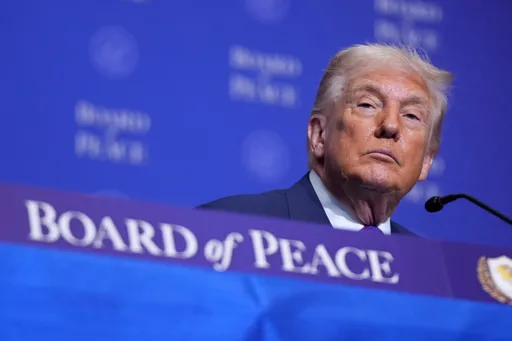Folk music, they say, is a reflection of contemporary society. A chronicle of the times. An oral repository of facts that could one day, perhaps, become documented history.
And Palestinian musician Kokym’s iconic song, Zaffit El Tahrer, tells the story of his country in a searing tale of love and lament—a young bride’s plea to her groom that she does not want a ring, or dowry, or a wedding dress but a ‘free Palestine’.
For Palestinians living under the shadow of the gun, music has been the balm to soothe their bruised hearts and bodies over the years. It has also provided an outlet for their pain and anguish.
Now musicians are reviving old folk songs to tell and re-tell the stories of the past—in a style that would appeal to young Palestinians. “As a young singer, I understand the youth many of whom don’t know Palestinian folk songs. That’s why I want to present such music in a modern way, and at the same time using a local Palestinian dialect,” Kokym tells TRT World.
He is not alone in this venture as other Palestinians are also making music with the same goal.
Music is life
Music is an integral part of Palestinian national and social occasions, the songs reflecting the daily life of the common people. Just like folktales, proverbs and riddles.
Throughout Palestinian history, singing—especially by women—has been an integral part of weddings and harvest seasons and even for something as mundane as washing clothes or while going to collect water from springs.
Palestinian folk music is rich in poetic creativity and expression and hold a special place in society along with the traditional Dabkeh dance and clothing which are seen as markers of Palestinian identity.
Some of the folk songs, basically rural music passed down through generations, exist in several versions, and are marked by simple, modal melody with stanzaic or narrative verse.
In recent years, some Palestinian musicians have reintroduced some of the folk songs, whether singing with a slight change of the original melody or updating the lyrics.
READ MORE: SOL: A music group from Gaza re-imagining Palestinian folklore
Different style
Kokym is one of the foremost musicians to introduce this trend.
“The older generation found it a little hard to listen to folk songs being reintroduced in a different style. But we need to link folk with the new Palestinian generation,” says Kokym, a singer and songwriter.
Kokym calls his music ‘Fallahi pop’ where he uses the rural dialect of the al-Muthallath area, where Palestinian towns and villages are concentrated in Israel, to preserve a dialect that is slowly going out of circulation.
Kokym studied music in Istanbul at the Arab Institute for Music. “Being in this beautiful city and learning music from great musicians, such as Maher Nanaa, was a wonderful experience for me. I developed my own music style. It is a different style but my audience is increasing,” says the singer whose music is mostly about unity, resistance, love, society and history.
Speaking about Zaffit El Tahrer, Kokym says the song came out of the blue and he first performed on a boat on the Bosphorus. “I was the DJ for a friend’s wedding on the boat. Suddenly, the power cut off and then we started chanting this song. The lyrics just came randomly.”
Love under occupation
Palestinian folk music have invariably reflected the times of suffering that the Palestinian people have endured.
During the Ottoman rule in Palestine, Palestinian music reflected the values that previous generations believed in. Songs had themes such as those showing zeal or lament and those sung during harvest seasons.
After the British mandate over Palestine and the establishment of Israel, folk music turned to be more on struggle, exile, homesickness and longing for freedom in songs like Hadi Ya Bahar Hadi. Some of its lines say “Keep calm, sea! Our absence has become too long. Give my salute to the land that raised us, and give my regards to the olive trees.”
In recent years, another young Palestinian singer, Mohammed Assaf, also revived some of the folk songs and used new lyrics for one of the most popular types of folk songs, the Mawwal, which uses several verses characterised by spelling vowel syllables longer than usual. Assaf mentions the letters of the Arabic word of Palestine, each letter represents a message whether on unity, detention or Al Aqsa.
“Nowadays, the themes of our songs describe what Palestinians are going through. I am preparing a new album that will shine the light on daily challenges Palestinians face.” Kokym explains. “One of my new songs will be named ‘Now on Qalandia checkpoint’ highlighting the suffering of two lovers who live apart.”
Qalandia is an Israeli checkpoint between the occupied West Bank and East Jerusalem.
“All my songs represent a story of a young man and all my song themes are related to Palestine,” adds Kokym who has set a classic folk song Ya Rayiheen Al Kudsto new lyrics.
Kokym said, “I make sampling by updating some of our folk songs. Ya Rayiheen Al Kuds is a song close to my heart. It had a lot of attention from Palestinians in the diaspora who are originally from Jerusalem. In the song, I go through many places in the old city that Palestinians from the old city can recognise.”
In this song, Kokym refers to places such as Stoh El Khan, Khan Alzait and other historical shops Jerusalemites relate to. He says, “I received many messages from Palestinian in diaspora who appreciated such song that reminded them of the narrow alleys of Jerusalem, the shops and evoked nostalgic feelings.”
Kokym says his music is also hugely influenced by the city where he spent a considerable period.
“I lived in Istanbul for six years. I studied visual design and music. Most of my music I made when I was staying in Uskudar. Seeing nature, the old houses and Istanbul bridges inspired all my music,” Kokym says.
READ MORE: Henna tattooing, a way to show belonging in Palestine























